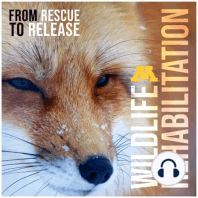40 min listen

S1E20 Wildfoods4Wildlife With Kate Guenther
S1E20 Wildfoods4Wildlife With Kate Guenther
ratings:
Length:
97 minutes
Released:
Jul 22, 2022
Format:
Podcast episode
Description
Calling all plant people, foragers and rehabilitators! Ready to forage for a cause? Naturalist Kate Guenther is working to bridge the gap between the foraging community and rehabilitators through her ongoing project Wildfoods4Wildlife. As a website and database designed to share knowledge of wild foods and animals’ diets, Wildfoods4Wildlife is a wonderful resource for rehabilitators, and volunteers interested in the connection between flora and fauna in wildlife rehabilitation. In this episode, Guenther discusses how foraging for rehabilitation can be used to help feed orphaned, injured or sick animals. We discuss the benefits and limitations behind the use of wild foods during rehabilitation. Rehabilitation volunteers and volunteer foragers can use this website to learn how they can assist their local rehabilitation centers. This resource is a great way to learn a new skill and gain insight on where to find and utilize foraging communities and other volunteer groups. Check out Wildfood4Wildlife.com for more information about wild foods and wildlife in your area. Kate suggested a few other resources on plant identification as you delve into the world of plants and foraging for the animals in your care. She suggested 3 books to get you started in Identification: Newcomb's Wildflower Guide; Peterson's Field Guide to Wildflowers and Plant Identification and Terminology: An Illustrated Glossary. This is our last podcast episode of this inaugural season! Thank you so much for coming along on this journey. Please connect! Did you have a favorite episode? Did you have a least favorite episode? Here is my email: gailbuhl@umn.edu Our next season will start sometime this fall. We will again have some episodes on caring for more "common" species in rehabilitation, a few on not common species, and other episodes will be on resources I hope you can use. Lastly, there will be at least ONE episode on training Ambassador Animals for use in conservation education. For those of you that know me my paid professional career has been in training, managing and presenting Ambassador Animals to the general public. I have had so much fun learning and putting this podcast together. We are such a wonderful diverse group of people that is always wanting to share and help others in their rehabilitation. Thanks to ALL of my guests this season for being SO willing to share their expertise with all of us! I have learned a lot, enjoyed my conversations and hope you have too. GailSpecial thanks to Partners For Wildlife and The Raptor Center at the University of Minnesota College of Veterinary Medicine. Our executive producer and host is Gail Buhl. Our producer is Kirk Klocke.To learn more about The Raptor Center, visit Homepage | The Raptor Center (umn.edu). For more on Partners for Wildlife, visit Partners for Wildlife Home | The Raptor Center (umn.edu).
Released:
Jul 22, 2022
Format:
Podcast episode
Titles in the series (45)
S1E2 Sara Cole: Establishing A Home Wildlife Rehabilitation Practice by Wildlife Rehabilitation: From Rescue to Release